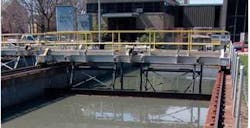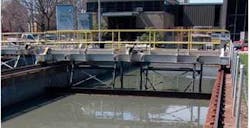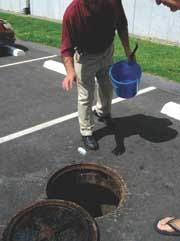Tablet System Helps Cut Grease Buildup
The easiest and most cost-effective solution for grease buildup is through pre-treatment. Treating the grease at its source reduces the back-up and buildup problems that can occur in municipal sewer systems; not to mention problems associated with grease traps, wet wells, and lift stations. Cellinite Technologies of Needham, MA, has developed a non-hazardous solution that is effective in reducing grease buildup without the need for mixing and dosing equipment or additional man-hours.
Cellinite BioTabsTM are a solid tablet treatment for wastewater that uses a patented oxygen delivery system to support aerobic bacteria in the breakdown of organic solid waste and grease. When dropped in a wastewater stream, the tablets sink to the bottom where they begin to super-oxygenate the wastewater from the bottom up. Buffers, nutrients, and aerobic bacterial spores are distributed throughout the wastewater in the oxygen plume created by the effervescing tablets. This begins the breakdown of organic waste and grease throughout the collection system.
The East Providence (RI) wastewater treatment facility found Cellinite BioTabs to be a cost-effective solution to its maintenance of a grease collection pit.
Grease skimmed off the plant’s primary tank is collected into a 7000 gallon grease pit. Prior to using the tablets, the grease pit had to be pumped out approximately four times a year to keep the grease pit effective. To pump out the tank, a septage hauler would be used at $100 per hour at a cost of $339 per 9000-gallon tank. The grease was then transferred to another treatment facility were it cost $345 per percentage of grease solid. In East Providence’s case, that would average 12 to 17 percent solids per transfer. Altogether, it cost approximately $4600 per maintenance event and about $17,000 annually.
In addition, the large amount of grease degrading in the grease pit resulted in noxious odors that were followed by complaints from the neighborhood.
Thomas Azevedo, Assistant Superintendent Water Pollution Control, witnessed how Cellinite BioTabsTM reduced hydrogen sulfide levels in a force main in the Town of Barrington and wanted to try the tablets to help ease his maintenance of the grease pit.
East Providence began applying six tablets twice a week on Monday and Thursday. The grease pit and its contents were then mixed with a portable mixer for 60 minutes to ensure proper blending. On Tuesdays and Fridays all of the free liquid was decanted from the pit and returned to the primary tank.
After seeing positive results in the reduction of grease solids and odors, the staff continued this process for 16 months. They have only pumped out the grease pit once in that timeframe. Even then the pumping was not because of grease build up, but to remove a build-up of plastic material that collected due to previous maintenance operations.
The elimination of grease pumping as a result of the BioTabs program has allowed the East Providence wastewater treatment facility to cut maintenance costs in half.
In addition to using the tablets in the grease pit, Azevedo also has successfully applied the tablets to the utility’s pump stations and to the influent line to an injector pump station to clean up the build-up of grease in the injector pot.


